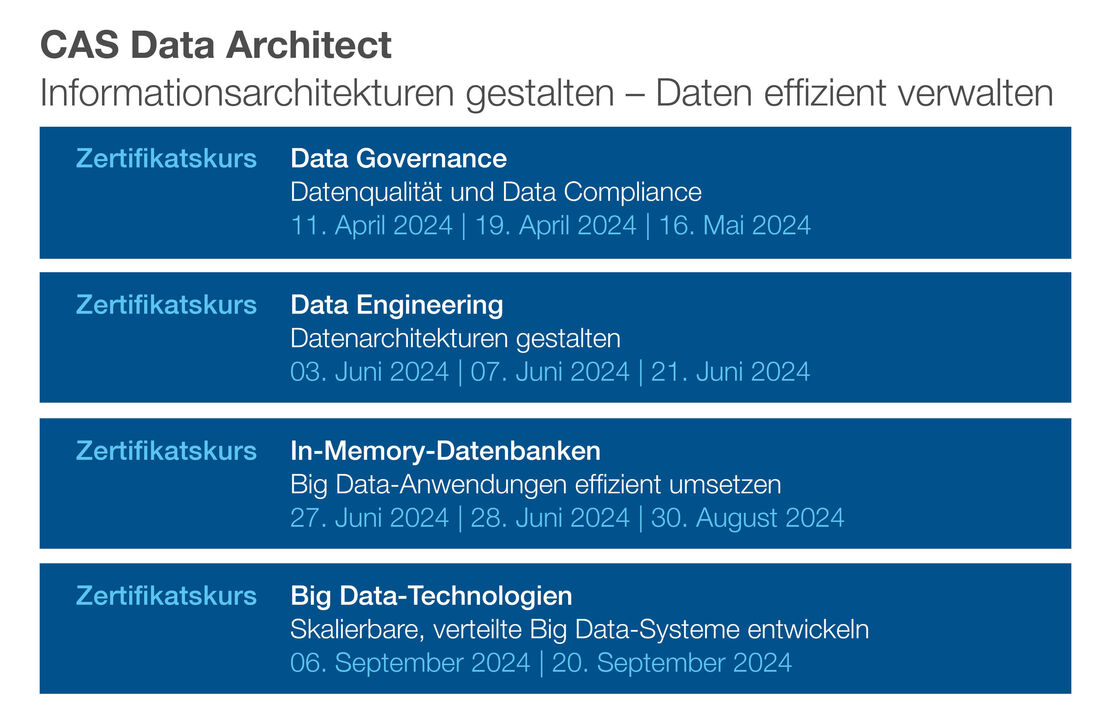"With Big Data, we can gain new insights from our data. To be able to process data efficiently with the desired quality, scalable data architectures are required."


"With Big Data, we can gain new insights from our data. To be able to process data efficiently with the desired quality, scalable data architectures are required."
Industry 4.0 and Big Data are just some of the challenges companies face today as society becomes increasingly digitized. Business and production processes must be redesigned to be data-oriented so that companies can continue to compete globally.
In order to treat data as a valuable resource in companies, prioritization and a comprehensive approach to information management are necessary. In this context, the rapid development in IT systems makes it difficult even for experts to select the appropriate tools for processing and analyzing "Big Data".
In the ONLINE certificate programCAS Data Architect, the technological, organizational as well as legal aspects of comprehensive information management are addressed in four consecutive certificate courses. It is aimed at specialists and managers who want to take on the role of a "Data Architect" in the company. As such, they are responsible for the technical architecture and selection of data management systems as well as for the organizational design of information processes.
Upon successful completion of the certificate program, you will be able to:
The certificate program is aimed at specialists and managers from all industries in the fields of information management, organization and process management,
The certificate program takes place in a combination of ONLINE presence and self-study units (blended learning). The self-study is accompanied by the online learning platform Moodle. The presence phases are held in an interactive seminar character, with impulse lectures and exercise elements alternating. The knowledge imparted is tested "hands-on" and there is the opportunity to work on individual questions and problems of the participants.
DATA GOVERNANCE
Data quality and data compliance.
"Data is like waste. You should know what you want to do with it before you collect it."
Mark Twain
There are opportunities and risks in equal measure for companies arising from the large volumes of "Big Data": How can big data be used to achieve business goals without creating security risks and compromising data quality? What legal requirements must be observed and how are the rights of data suppliers complied with? Which processes and roles need to be designed?
Data governance provides solutions to these challenges. It ensures a functioning framework and compliance with standards.
In this certificate course, you will learn which processes, methods and tools are available to make data in a company easily accessible and, at the same time, to store it correctly, secure it and file it in a uniform manner. You will be able to determine who is responsible for the stored information and how the data should be handled. Only a company-wide and systematic approach to data governance can ensure a high level of data quality and usability in the long term.
BIG DATA TECHNOLOGIES
Develop scalable, distributed Big Data systems.
"Data is the new science. Big Data holds the answers."
Pat Gelsinger
To cope with the rising tide of information, many technologies have been launched in recent years under the buzzword "Big Data" to develop efficient, scalable applications that can process large amounts of data. However, the range of commercial or also free open source software is so large that even experts find it difficult to select suitable technologies for a use case.
In this certificate course, you will get an overview of different Big Data systems (e.g. Hadoop, Spark) and can learn with practical case studies for which use cases they are suitable. In addition, you will learn the fundamental principles of distributed, scalable Big Data architectures in order to be able to classify and evaluate systems accordingly. Through practical exercises with current Big Data systems and the discussion of individual questions, you can transfer the contents of the course to your everyday work.
DATA ENGINEERING
Designing Data Architectures
"Data science is about asking interesting questions based on the data you have - or often the data you don't have."
Sarah Jarvis
Digitization is creating an ever-increasing flood of data of various kinds in companies, which is needed at various points in business or production processes. The availability and usability of data is thus necessary for efficient business management. However, the diverse data management solutions that have emerged in recent years under the buzzword "Big Data" present companies with the challenge of choosing suitable technologies.
In this certificate course, you will learn about various aspects that are necessary for efficient and effective data management. In addition to the topics of data modeling (relational and NoSQL), data cleaning and data integration, the course also presents more comprehensive concepts for data architectures such as data warehouse, data lake or lambda architecture. Practical exercises with current data management systems and discussion of individual issues with the lecturer will enable you to transfer the contents of the course to your everyday work.
IN-MEMORY DATABASES
Implementing Big Data applications efficiently
"You can only grow if you are massively innovative."
Hasso Plattner
Many companies are currently facing the challenge of having to process a constantly increasing volume of data. The right information should be available at the right time in adequate form, quantity and quality for the respective users in the company - and in just a few seconds. Traditional relational database systems often reach their limits when it comes to meeting these requirements. Modern database models do not store their data on conventional hard disk storage, but use the main memory directly for this purpose. This allows significantly higher access speeds and, as a consequence, shortens and efficiently supports operational decision-making processes.
This certificate course shows the potential of Big Data applications based on in-memory technologies for a company and what open questions and hurdles exist. You will work on case studies with the in-memory database SAP HANA and can discuss individual questions from your own company with the lecturer and professionally experienced peers.
The curriculum and further information can be found in the brochure (to be updated soon) and in the download area.
11 ONLINE dates of the courses - on request at weiterbildung(at)hsnr.de
Between the attendance days there are online-supported self-study phases.
Why is continuing education on the topic of information architectures and data management currently of interest to many professionals?
"Currently, there is a lot of talk about artificial intelligence and machine learning. Many companies are investing in these technologies and want to use new methods to get more out of their data. However, it is often ignored that new insights can only be gained with data analysis if sufficient data of good quality is available. However, this is a problem in many companies, as data is often managed in individual silos without any content or technical correlations. In this CAS, we want to show how to improve data management in companies by building a comprehensive information architecture."
You can find the vitae of your lecturers in the download area.


Reinarzstraße 49

Looking for the right counseling center? Our counseling navigator will help you find it.